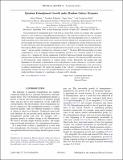| dc.contributor.author | Nahum, Adam | |
| dc.contributor.author | Ruhman, Yehonatan | |
| dc.contributor.author | Vijay, Sagar | |
| dc.contributor.author | Haah, Jeongwan | |
| dc.date.accessioned | 2018-05-11T17:15:47Z | |
| dc.date.available | 2018-05-11T17:15:47Z | |
| dc.date.issued | 2017-07 | |
| dc.identifier.issn | 2160-3308 | |
| dc.identifier.uri | http://hdl.handle.net/1721.1/115328 | |
| dc.description.abstract | Characterizing how entanglement grows with time in a many-body system, for example, after a quantum quench, is a key problem in nonequilibrium quantum physics. We study this problem for the case of random unitary dynamics, representing either Hamiltonian evolution with time-dependent noise or evolution by a random quantum circuit. Our results reveal a universal structure behind noisy entanglement growth, and also provide simple new heuristics for the “entanglement tsunami” in Hamiltonian systems without noise. In 1D, we show that noise causes the entanglement entropy across a cut to grow according to the celebrated Kardar-Parisi-Zhang (KPZ) equation. The mean entanglement grows linearly in time, while fluctuations grow like (time)[superscript 1/3] and are spatially correlated over a distance ∝(time)[superscript 2/3]. We derive KPZ universal behavior in three complementary ways, by mapping random entanglement growth to (i) a stochastic model of a growing surface, (ii) a “minimal cut” picture, reminiscent of the Ryu-Takayanagi formula in holography, and (iii) a hydrodynamic problem involving the dynamical spreading of operators. We demonstrate KPZ universality in 1D numerically using simulations of random unitary circuits. Importantly, the leading-order time dependence of the entropy is deterministic even in the presence of noise, allowing us to propose a simple coarse grained minimal cut picture for the entanglement growth of generic Hamiltonians, even without noise, in arbitrary dimensionality. We clarify the meaning of the “velocity” of entanglement growth in the 1D entanglement tsunami. We show that in higher dimensions, noisy entanglement evolution maps to the well-studied problem of pinning of a membrane or domain wall by disorder. Subject Areas: Condensed Matter Physics, Quantum Information, Statistical Physics | en_US |
| dc.description.sponsorship | Gordon and Betty Moore Foundation (Grant GBMF4303) | en_US |
| dc.description.sponsorship | Engineering and Physical Sciences Research Council (Grant EP/N028678/1) | en_US |
| dc.description.sponsorship | Kavli Institute for Theoretical Physics (Graduate Fellows Program) | en_US |
| dc.description.sponsorship | United States. Department of Energy. Division of Materials Sciences and Engineering (Award DE-SC0010526) | en_US |
| dc.description.sponsorship | Massachusetts Institute of Technology (MIT Pappalardo Fellowship in Physics) | en_US |
| dc.publisher | American Physical Society | en_US |
| dc.relation.isversionof | http://dx.doi.org/10.1103/PhysRevX.7.031016 | en_US |
| dc.rights | Creative Commons Attribution | en_US |
| dc.rights.uri | http://creativecommons.org/licenses/by/3.0 | en_US |
| dc.source | American Physical Society | en_US |
| dc.title | Quantum Entanglement Growth under Random Unitary Dynamics | en_US |
| dc.type | Article | en_US |
| dc.identifier.citation | Nahum, Adam, et al. “Quantum Entanglement Growth under Random Unitary Dynamics.” Physical Review X, vol. 7, no. 3, July 2017. © 2018 American Physical Society | en_US |
| dc.contributor.department | Massachusetts Institute of Technology. Department of Physics | en_US |
| dc.contributor.mitauthor | Nahum, Adam | |
| dc.contributor.mitauthor | Ruhman, Yehonatan | |
| dc.contributor.mitauthor | Vijay, Sagar | |
| dc.contributor.mitauthor | Haah, Jeongwan | |
| dc.relation.journal | Physical Review X | en_US |
| dc.eprint.version | Final published version | en_US |
| dc.type.uri | http://purl.org/eprint/type/JournalArticle | en_US |
| eprint.status | http://purl.org/eprint/status/PeerReviewed | en_US |
| dc.date.updated | 2017-07-26T22:00:13Z | |
| dc.language.rfc3066 | en | |
| dc.rights.holder | authors | |
| dspace.orderedauthors | Nahum, Adam; Ruhman, Jonathan; Vijay, Sagar; Haah, Jeongwan | en_US |
| dspace.embargo.terms | N | en_US |
| dc.identifier.orcid | https://orcid.org/0000-0002-3488-4532 | |
| dc.identifier.orcid | https://orcid.org/0000-0002-4420-4932 | |
| mit.license | PUBLISHER_CC | en_US |
